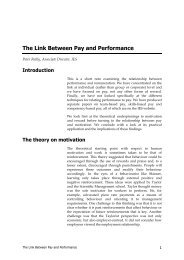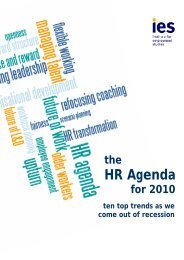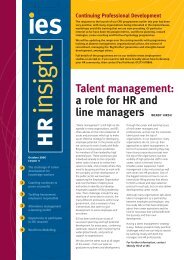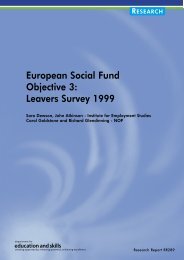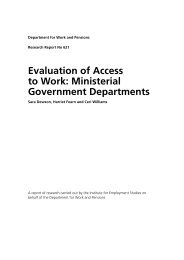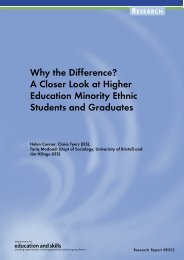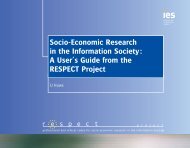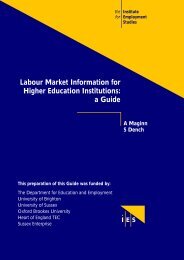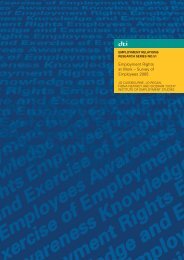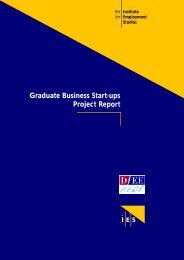Post-16 Transitions: a Longitudinal Study of Young People with ...
Post-16 Transitions: a Longitudinal Study of Young People with ...
Post-16 Transitions: a Longitudinal Study of Young People with ...
You also want an ePaper? Increase the reach of your titles
YUMPU automatically turns print PDFs into web optimized ePapers that Google loves.
“In school he had quite a lot <strong>of</strong> high pr<strong>of</strong>ile attention from a lot <strong>of</strong><br />
experienced teachers but we seemed unable to help him in that it<br />
never went beyond the moment. Whatever advice you gave him,<br />
whatever skills you tried to teach him, he could not use them in<br />
the situation so in the moment he would nod and yes, he<br />
understood, but when he went out into the true testing ground<br />
which was his relationships <strong>with</strong> other people, he couldn’t activate<br />
or use the help we had given him.”<br />
In fact, Matthew’s behaviour became worse, though by the time it<br />
reached crisis point, the school decided it was too late to go<br />
through the time-consuming statutory assessment processes.<br />
Instead, they negotiated <strong>with</strong> Matthew’s family to place him on a<br />
link course <strong>with</strong> a local FE College. However, this placement too<br />
broke down and, we were told, after Matthew had been involved<br />
<strong>with</strong> a group <strong>of</strong> other students on the fringes <strong>of</strong> some criminal<br />
activity, he was asked to leave.<br />
All <strong>of</strong> the young people so far in this section managed to find a<br />
‘champion’ who <strong>of</strong>fered them and their families personal support<br />
and was in a position to marshal resources to support the young<br />
person in school. However, not all young people were so fortunate.<br />
Stuart is visually impaired and his mother talked <strong>of</strong> the lack <strong>of</strong><br />
understanding displayed by the school, even though some <strong>of</strong> the<br />
external trappings <strong>of</strong> support were clearly in place:<br />
“…we found the SENCO extremely unhelpful. We didn’t feel that<br />
she was sympathetic to his needs, certainly didn’t understand his<br />
difficulties <strong>with</strong> relationships. You know she was very quick to just<br />
tell him what to do rather than facilitate, rather than to see how he<br />
could be in the situation. They had an Aspergers link unit and most<br />
<strong>of</strong> the school saw him as having Aspergers syndrome, you know<br />
and so just ignored him. She didn’t sort <strong>of</strong> look for ways <strong>of</strong><br />
involving him <strong>with</strong> the unit or <strong>with</strong> people. She would give him a<br />
list <strong>of</strong> things he ought to do and didn’t recognise that he had the<br />
assistant sitting next to him in all the classes [and that] made him<br />
sort <strong>of</strong> different.”<br />
Eventually, on the advice <strong>of</strong> a specialist peripatetic teacher, Stuart<br />
moved to a specialist college, where he became much happier.<br />
It is dangerous to generalise too far from these cases. For<br />
instance, in the sample <strong>of</strong> <strong>16</strong>, special schools appear to be<br />
experienced marginally more positively by young people and their<br />
parents than are mainstream schools. On the other hand, the<br />
populations <strong>of</strong> the two types <strong>of</strong> school are not directly comparable<br />
in such a small sample. Nonetheless, some themes do seem to<br />
emerge in terms <strong>of</strong> school experience:<br />
Schools can and do provide high levels <strong>of</strong> support which maintain<br />
young people in education, bring about personal, social and<br />
academic growth and create a stable platform from which<br />
transition can begin.<br />
As in Carl and Matthew’s cases, support may centre around a<br />
teacher or support assistant <strong>with</strong> the necessary time and<br />
commitment.<br />
<strong>Post</strong>-<strong>16</strong> <strong>Transitions</strong> <strong>of</strong> <strong>Young</strong> <strong>People</strong> <strong>with</strong> SEN: Wave 2 53



